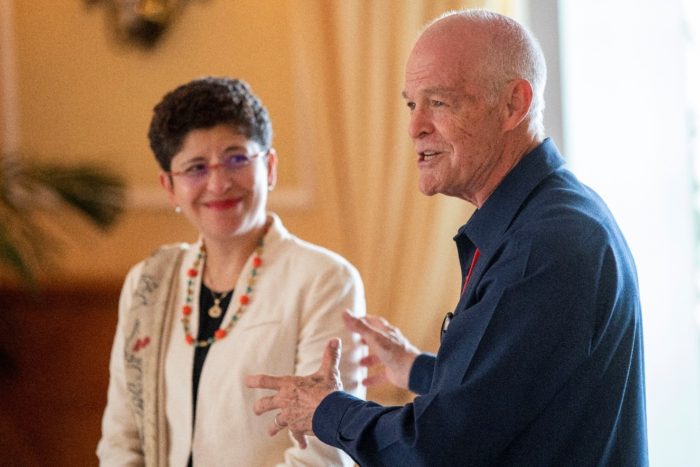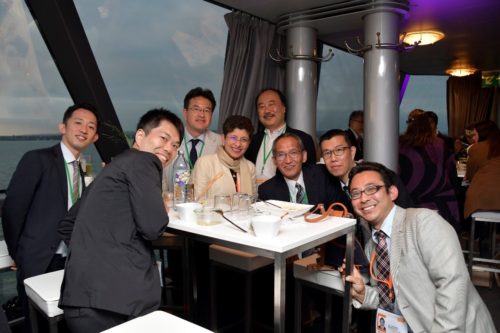Religious Leaders Leading Efforts Promoting SDGs, including Overcoming Violence Against Women
August 22, 2019(Lindau, Germany) Religions for Peace held its third plenary session entitled “Advancing Shared Well-Being by Promoting Just and Harmonious Societies. Mr. Dominik Bartsch [Representative of United Nations High Commissioner for Refugees, Germany] offered the opening address, noting:
Grand Mufti Sheikh Shaban Ramadhan Mubaje [Co-Moderator for the African Council of Religious Leaders-RfP (ACRL-RfP)] and Archbishop John Baptist Odama [Archbishop of Gulu, Uganda] reported on their experiences in Uganda. RfP advocated the opening of the border between Rwanda and Uganda and called for openness to dialogue between the countries. Sheikh Mubaje said, “Uganda is a success story. We have converted a region where there used to be war into a place of welcoming refugees with the Inter-religious Council of Uganda-RfP.
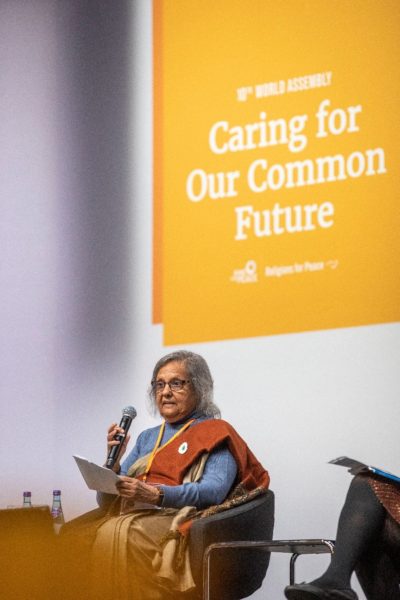 Hon. Ela Gandhi [Trustee, Gandhi Development Trust; Co-President, Religions for Peace] spoke of her continued efforts organizing at
Hon. Ela Gandhi [Trustee, Gandhi Development Trust; Co-President, Religions for Peace] spoke of her continued efforts organizing at
the grassroots level to overcoming domestic violence, rape and trafficking in South Africa.
She noted that the cohort she organized identified the following observations and possible interventions:
- – Abuse within the family often starts with break down in mutual respect. Often, women believe that it is their own fault, deterring them from seeking help before it becomes fatal
- – Silence of women exacerbates the abuse and women should be encouraged to seek help at the earliest signed of abuse. However, it is also very important to understand why many women choose to remain silent.
- – Successful prosecution and conviction of domestic violence is rare. Delayed cases often cause women lose the necessary evidence to enable successful conviction.
- – We can all be encouraged that Religions for Peace is already planning a pilot project in several states that will involve distributing an ingenious DNA rape kits that can become evidence for prosecuting the crime of rape.
- – We found that telephone help line was a helpful tool to enable women to confide in another without revealing their identity. Religious communities can support these initiatives. Training is of utmost importance.
Kenyan women’s rights activist Wangu Kanja and the British scientist Lisa Smith from the Department of Criminology at the University of Leicester presented more information on this pilot program at “Agora,” the “Market of Ideas” just outside the venue of the main conference hall of the RfP 10th World Assembly.
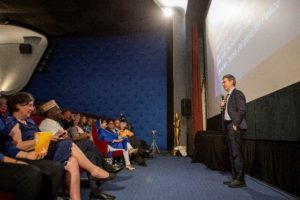
In the afternoon, the “Equipping for Action” session offered conference participants the opportunity to participate in interactive workshops, converse with high-level diplomats, listen to “Lightning Talks” and view trailblazing presentations.
During the afternoon Lightning Talks, local Lindauers and Assembly participants listened to short talks, personal stories and inspiring ideas from religious representatives and peace activists from around the world. Participants include Professor Dr. Jeffrey Sachs [Director of the Center on Sustainable Development; Special Advisor to the UN Secretary-General and International Trustee of RfP] and Rabbi Sir David Rosen [International Director of Interreligious Affairs at the American Jewish Committee and Co-President of RfP].
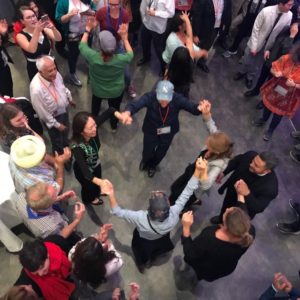 In the evening, delegates enjoyed a boat ride around Lake Constance aboard the Sonnenkonigin. Delegates were able to causally mingle, connect with each other and celebrate a week of personal growth and multi-religious action.
In the evening, delegates enjoyed a boat ride around Lake Constance aboard the Sonnenkonigin. Delegates were able to causally mingle, connect with each other and celebrate a week of personal growth and multi-religious action.
